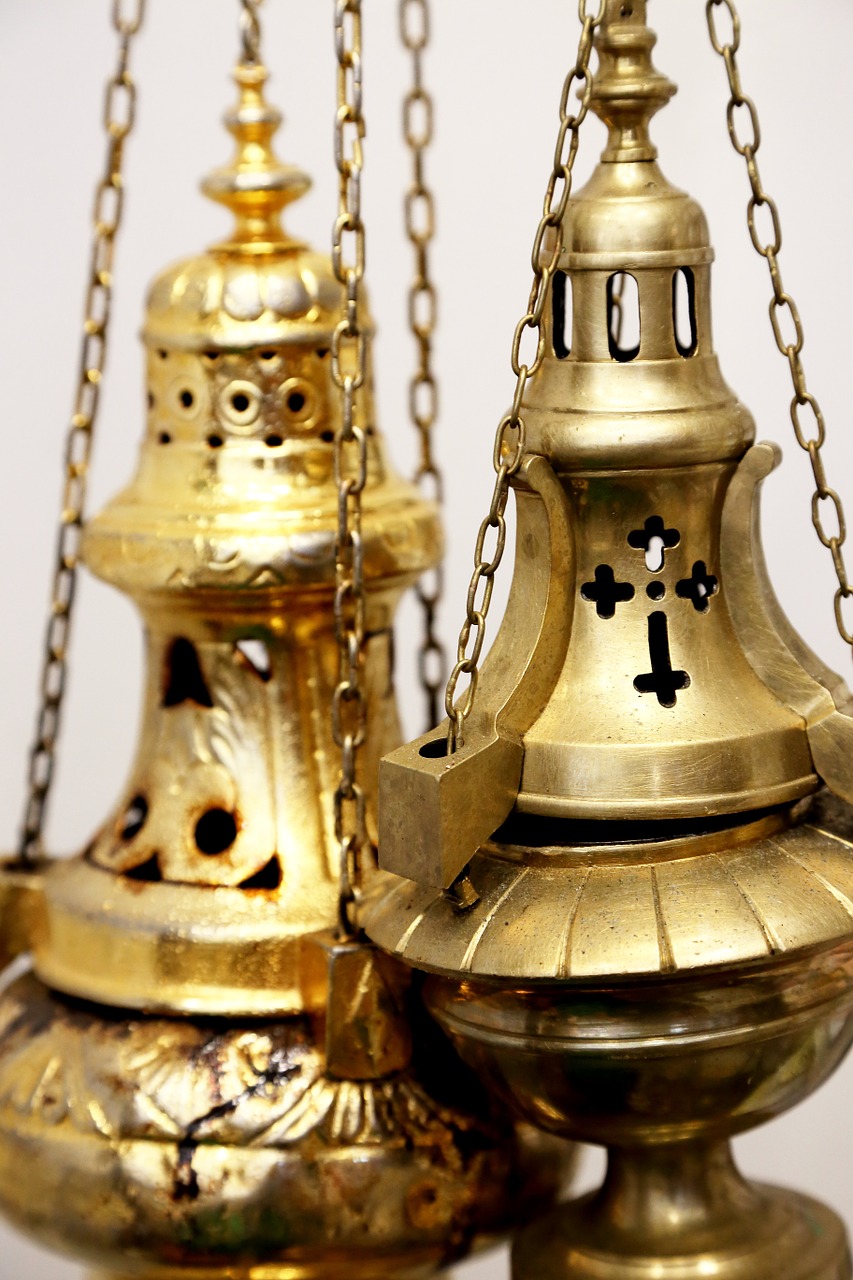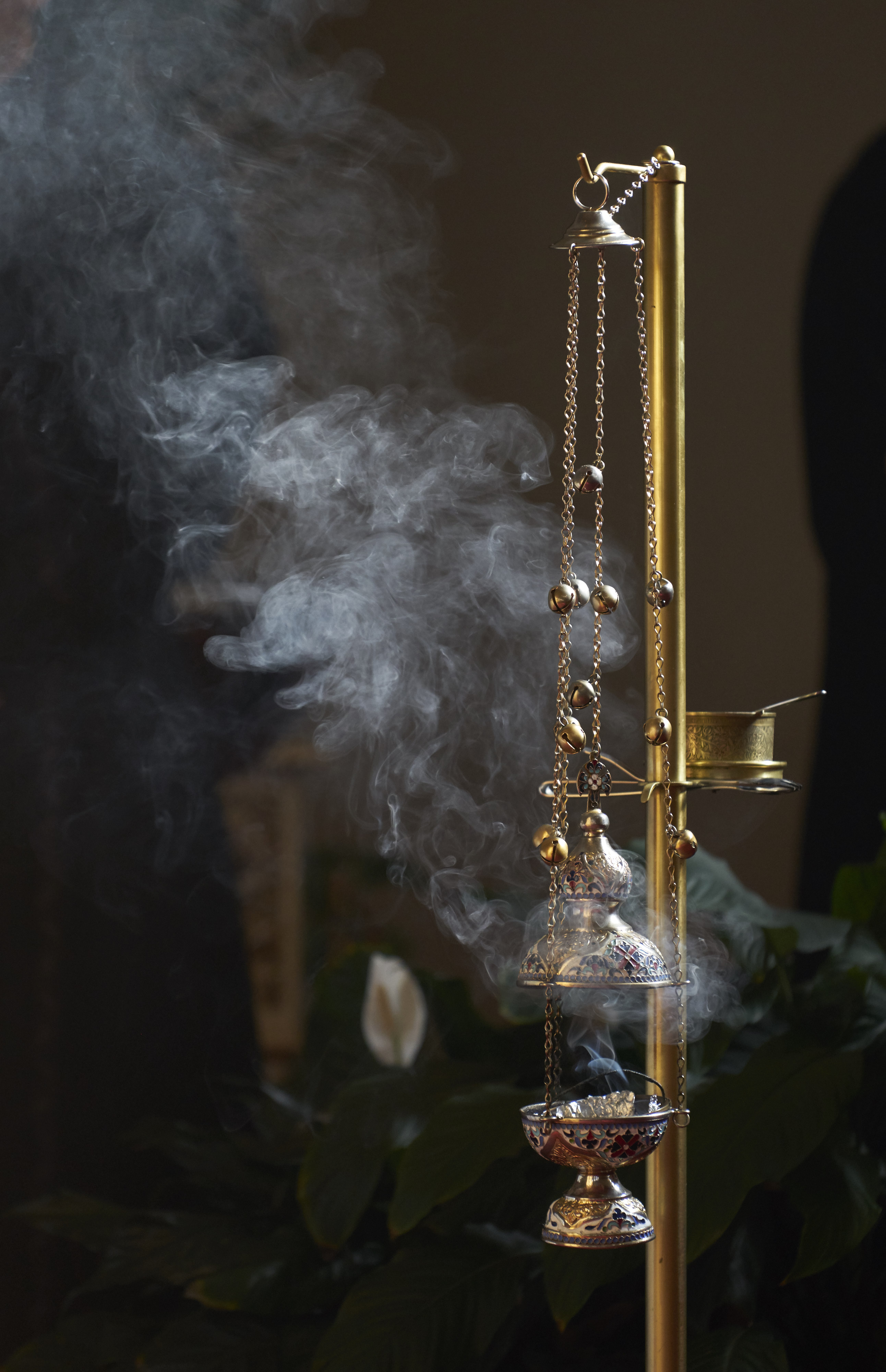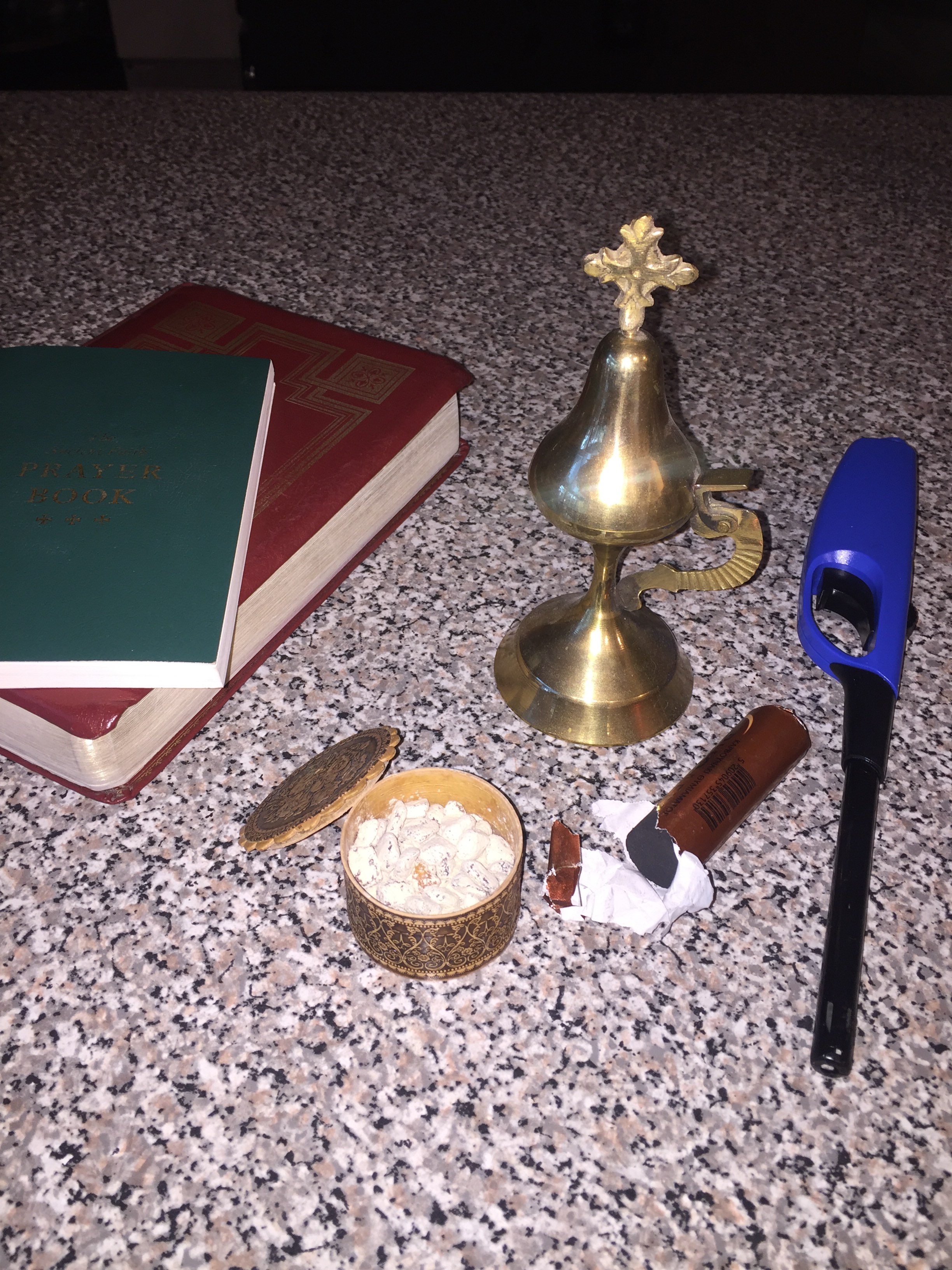On a recent weekday I was walking from my church’s fellowship hall into the nave to light a jar candle and pray for a friend in need. My thoughts were pinging around as usual, and I wasn’t feeling particularly spiritual.
But when I opened the door to the narthex, my heart registered a sacred truth well before my mind caught up: I had entered a holy place.
The signal came not from the sight of the sand in the candle stand or the echo of my sandals on the marble floor; it came from the lingering aroma of incense.
Before my impressions could organize themselves into words, my nose had registered a fragrance that means worship. A fragrance that means prayer. A fragrance that tells me that this place, here and now, is set apart as God’s holy temple.
The Power of Scent

I treasure the aroma of incense at my church, not only for its symbolic meaning and the added dimension of beauty that it brings to worship, but because of the way incense “speaks” to my heart. I spent the majority of my Christian life in the Evangelical world, where incense was never a part of the worship experience. My church memories are not related to any particular smell at all, except a few unintended odors: pine-scented cleanser, mildew from a roof leak on carpet, or stale food from a recent potluck dinner prepared in an adjacent kitchen.
But in my Orthodox life now, I am grateful to encounter that faint fragrance every time I enter the church. It brings my attention to the Kingdom of God, providing a sensory reminder to “attend,” to silence my mind and focus my heart for worship. (Incense also can be an irritant for some. Please see *“A Note on Allergies” at the bottom of this post.)

I won’t pretend to understand the parts of the brain that are activated by the olfactory nerve. All I know is that our sense of smell brings powerful associations to our minds, even more so than visual cues from old photographs or the sound of Grandpa’s favorite jazz song on a scratched vinyl album.
Sometimes scent stirs sad memories. With one whiff of a certain industrial cleaner I am immediately transported back to the assisted living center where my grandparents lived. The distinctive smells of a hospital corridor remind me of my mom’s final days after her stroke.
But our sense of smell also holds lovely reminders. The intoxicating aroma of sugar cookies in the oven brings back memories of a childhood kitchen at Christmastime. On a mountain hike, the earthy fragrance of pine needles and soil underfoot reminds us to slow down and enjoy the beauty just as powerfully as the scenic view and the whisper of the wind through the trees.
Incense in Scripture
God, who lovingly created us as physical, sensory beings, instructed the Israelites in the proper worship of Him. It is no coincidence that He incorporated our senses in His commands for worship, including the use of incense.
As the Israelites wandered in the wilderness, God instructed Moses,
You shall make an altar … Aaron shall burn on it sweet incense every morning; when he tends the lamps, he shall burn incense on it. And when Aaron lights the lamps at twilight, he shall burn incense on it, a perpetual incense before the Lord throughout your generations. (Ex. 30:1,8 NKJV)
Most Protestant denominations ignore the term “perpetual,” or they believe, along with John Calvin and the later Puritans, that incense in the Old Testament sacrificial system was merely a shadow or type, which Christ fulfilled; thus it is no longer necessary.
They seem to have forgotten the book of Revelation, where St. John the Theologian writes,
Then another angel, having a golden censer, [who] came and stood at the altar. He was given much incense, that he should offer it with the prayers of all the saints upon the golden altar which was before the throne. And the smoke of the incense, with the prayers of the saints, ascended before God from the angel’s hand. (Rev. 8:3-4, NKJV)

For a few hundred years in early Christianity, incense may not have been in use (the evidence is unclear), possibly because of its association with emperor worship and other forms of idolatry. (Thousands of Christians were martyred after refusing to burn incense to Caesar.) But incense eventually was restored to Christian worship, fulfilling the prophecy of Malachi:
For from the rising of the sun, even to its going down,
My name shall be great among the Gentiles;
In every place incense shall be offered to My name,
And a pure offering;
For My name shall be great among the nations,”
Says the Lord of hosts. (Mal. 1:11)
The Orthodox Study Bible describes this verse as “a remarkable and clear prophecy that the Gentiles, in their worship of God, in every place or church will burn incense before Him—as Israel had done. To this day, incense is offered in nearly every service of the Orthodox Church.”
The Church Understands Human Psychology
My priest likes to remind us that the word psychology means “study of the soul,” from the Greek word psyche, “soul.” The Church understands how we humans operate: we absorb information and meaning through our senses, not only through our intellects. Thus there is a physicality to Orthodox worship that has been wrongly abandoned by other Christian groups.
Of course, incense in and of itself is not worshipful. I grew up during the hippie era, in a suburban environment that was far removed from the Haight-Ashbury district. Still, I vividly remember what I consider to be the Scents of the Seventies: patchouli and sandalwood. One whiff of either of them fills my mind with images of bell bottoms, leather fringe, and turquoise jewelry. Creedence Clearwater Revival is playing in the background, which is not a bad thing. But I don’t associate anything peaceful or Christ-centered with memories of those skinny sticks of incense in ceramic bowls.
For incense to be a part of true worship, every formulation must contain one essential ingredient: prayer. As Presvytera Georget Photos wrote in a wonderful article in Praxis,
Many cultures use incense in a variety of types and fragrances; however, when you use this common incense, you probably do not feel the same gratification or sense of peace as you do when you sit in church and savor the fragrance of the sacred incense. Common incense is missing a key ingredient: prayer. The sincerity and passion of prayer transforms incense into a vehicle to help our supplications rise to heaven. (Praxis, Vol. 8, Issue 2, Fall 2009)
We are reminded of this truth in the beloved Scripture verse chanted at every Vespers service during the censing of the temple:
Let my prayer be set before You as incense,
The lifting up of my hands as the evening sacrifice. (Ps. 140/141:2)

Incense in the Home
The use of incense at home provides a beautiful way to bring tranquility and a reminder of God’s presence into our busy lives.
Presvytera Georget continues,
Orthodox faithful burn incense in their homes when they pray before their icons or as they walk around the house censing the windows and doorways, bringing a sense of peace to their homes, typically on Saturday nights or on the evenings of a Great Feast.
Incense, or livani, helps set an atmosphere of prayer and peace. It was one of the first gifts given to our Lord by one of the Three Wise Men in honor of His birth. Incense links us spiritually to God. The sweet mystical smoke that dispelled the worldly odors at Christ’s own home acts as a vessel, carrying our prayers to God.

I love this idea, but censing as a spiritual practice is new to me. A few years ago, when I discovered that incense is not only for church but also for life in the “home church,” I took an informal, unscientific poll. My polling method consisted of blockading my cradle Orthodox friends on their way out of the fellowship hall and peppering them with questions. (Shockingly, all of them are still on speaking terms with me.) I asked them if they used incense in their homes, when and how they used it, and to recommend any accompanying prayers or psalms.
I was surprised to discover that most of them did not cense their homes, so I didn’t get much in the way of direction or ideas. (Thanks, guys!) Yet I especially like the idea of using incense as preparation on Saturday evenings or the evening before a feast day.
Readers, how do you incorporate incense into your homes? Are there specific prayers or psalms that you like to chant while censing, or can you recommend any resources that explain ways to establish this practice? Please share your thoughts in the Comments section below.
I am eager to learn from you!
* A Note on Allergies
Unfortunately, in our chemically oversaturated world, some people experience extreme sensitivity to incense—enough discomfort and breathing difficulties to drive them out of the church. Recently, a caller on Fr. Evan Armatas’s show, Orthodoxy Live, asked for advice on what to do for this kind of allergic response. Father Evan suggested standing at the perimeter of the nave, in the back near the choir, or near a vent to help with air circulation.
He also noted that some people are actually allergic to the additives or preservatives in many incense formulations. Some purer forms of incense can eliminate this type of problem.
Additionally, incense can pose a challenge for people with a variety of disabilities, such as lung impairments or sensory processing challenges. Summer Kinard’s upcoming book from Ancient Faith Press, Of Such Is the Kingdom: A Practical Theology of Disability, offers several suggestions for handling such difficulties.
If the incense in your parish is aggravating your worship experience instead of enhancing it, talk to your priest about possible solutions.
Being a relatively recent convert to Orthodoxy (it’ll be ten years next February), I have not yet acquired a clear sense of the use of incense in the home. I use it during morning prayers, but somewhat sporadically. (My prayer corner is in a pretty tightly-sealed basement, so I’m a little concerned about what I’m doing to the air quality down there, long-term. Then there’s the build-up of soot…ah, perhaps I should move the prayer corner upstairs some day.) I appreciated your comments about the lingering smell of incense at church — I often enjoy popping into the nave one last time before going home on Sundays, after spending time in the fellowship hall. It always feels like there’s something special still going on in that room, as though the saints and angels are continuing to worship God even though the room itself is silent. It’s a pure, clean kind of silence, loaded with…something.
Yes! I like to say that the nave is never truly empty. Of course God is “ever present and filling all things,” but the unseen presence of the saints and angels has always drawn me there. That sense of presence is so palpable that during my time as an inquirer, I would come to church on weekdays just to sit quietly in the temple with my journal. I had a hundred questions, but I basked in the fullness there.
Also, I vote for moving the prayer corner upstairs. LOL
This was wonderful! Thank you. I often light incense in the mornings while I do my readings and prayers. When my youngest son wakes up, sometime he will say “I smell God”. It always makes me smile.
Ohmygosh, that is so precious!
We keep various icons throughout our house (two prayer corners, icons in the kids’ bedrooms, etc.). On Saturday nights and the evenings of great feasts, we burn incense in a hand censer and process with the children (7, 5, 2, 1) around the house while singing either the Trisagion or the troparion of the feast. We cense the icons, arriving finally back at the family icon corner.
This is wonderful. Your children are so blessed!
One beautiful thing about our orthodox services is that we incorporate all 5 senses! Another reason I’m so proud and blessed to be orthodox.
Yes! God speaks to us through all of our senses.
It is so heartening to see an article about incense which also speaks to the needs of those who cannot handle it due to a medical problem. Thank you for understanding.
☺️
Our church tends to be sparing on the incense for several reasons. The chief is that our priest himself has lung issues, and our bishop not only gave him permission to use less, but checks on him regularly. But this has been a blessing as inquirers in our area can now be directed to our parish if they have sensitivities. When certain parishioners are present, no incense at all is used.
This is a wonderful example of economia, the adaptation of rules to the circumstances and needs of the individual. I’m so glad your bishop is understanding.
Hey, there’s Fr. Lou Christopulos! A wonderful pastor.
Yes, he is. 🙂